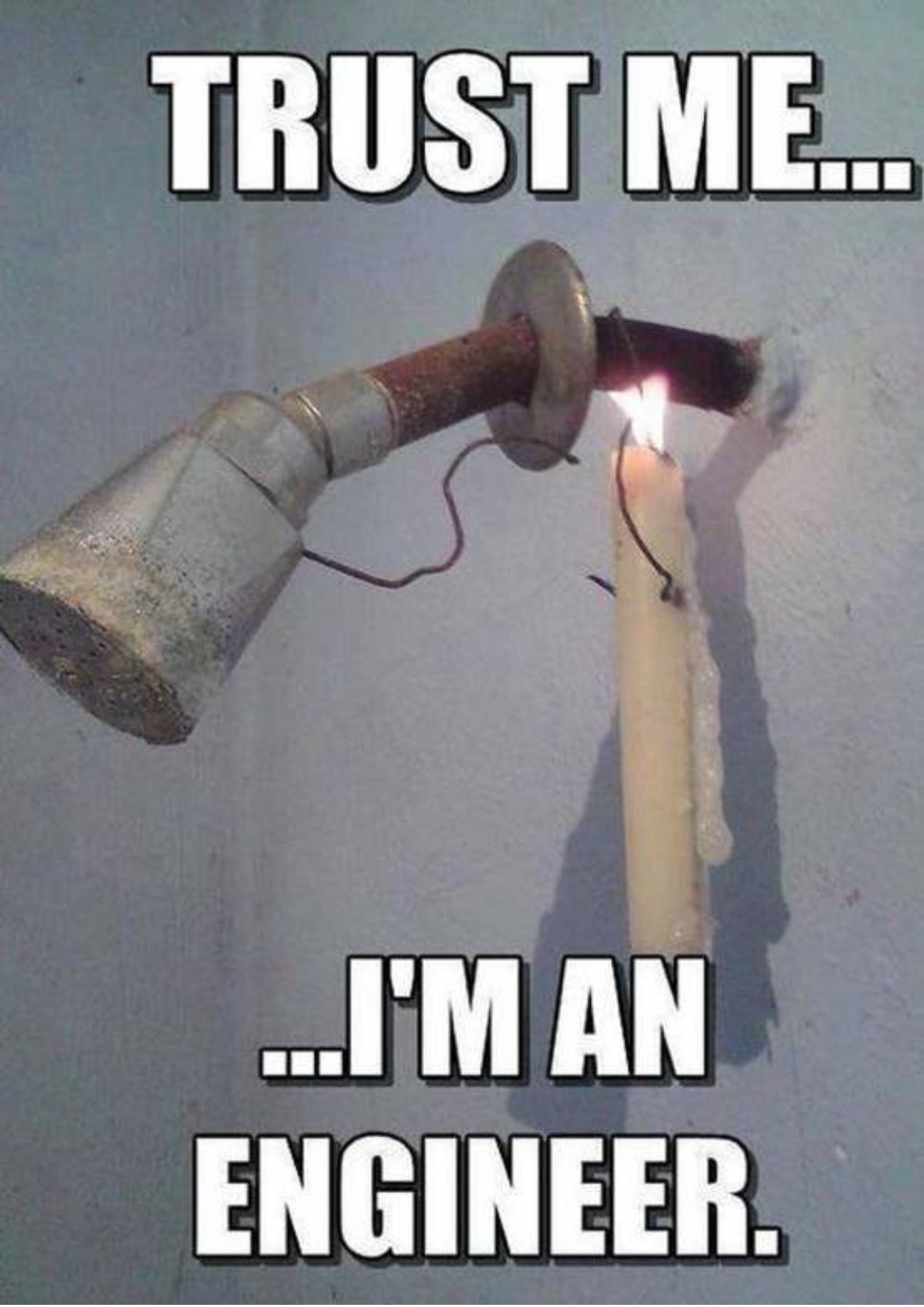I’m an engineer. I’m on my phone looking at memes until someone asks me a question, then I do a thing in 5 minutes that they expected to take 5 days because people don’t understand computers, then I go back to the memes.
Sounds like tech support, not engineering
I have been downvoted to hell for what I’m about to say, but I’m going to say it again anyway.
IT support people are now called engineers. No, I don’t like it. No it’s not proper “engineering”. Yes, language evolves and there’s nothing we can do about it. If that’s a problem for people, I recommend screaming into the void. It doesn’t help, but you feel better after a while.
IMO no engineering degree, no engineer. There’s some exceptions for incredible self taught folks but they’re drowned out by so many others that just use the title without the skill
Why stop there? No PE no engineer.
You can arbitrarily gatekeep the title all you want, but the reality is that engineering is a group of concepts and ideologies that can be applied to many disciplines in many ways.
Just because the person doing the engineering doesn’t meet your personal standards doesn’t mean engineering isn’t being accomplished.
There is nothing about the engineering process that requires a degree.
All that being said. A professional engineer is an actual controlled title. (You can’t sign documents as a PE without getting the license, just like an attorney (JD) or doctor (MD)) but far and away most engineers, do not have this title, because most engineering jobs and tasks don’t require it.
Finally, (in most states) you can work with no degree under a PE for four years, pass the FE and PE, get your title and build a bridge. So as far as the most stringent title goes, it still doesn’t actually require a degree.
I think most engineers have an understanding amongst each other, regardless of their specialty, we can all teach ourselves to problem solve. So many math and physics classes as an EE just to get to my core classes. It definitely a certain type of person to get through the thick of it.
Major engineering organizations, like the IEEE or the ASME, often require degrees, but do have exceptions built into the rules for on the job experience. So this does happen, and regularly enough that there’s consideration for it.
It’s corporate self aggrandizing wank. On par with calling subway workers “sandwich artists”. It’s as insulting to the workers as it is ridiculous
insulting to the workers
Then why do the workers choose to identify as such in public?
No one at Subway is going around calling themselves an artist.
That’s kind of my point. No one at subway is calling themselves artists, it’s insulting and they don’t like it. You answered your own question, the answer is: they don’t.
In instances where they use their given title it’s probably for convenience. I’m an EMT, when I was doing interfacility runs for a private ambulance company (aka not doing the expected work of an EMT) I didn’t call myself an ambulance driver or professional insurance fraud fall guy, I called myself an EMT because it was easier to use in day to day conversation. If someone wanted to talk about it I would explain the nuances but I’m not gonna do that every time someone asks me what I do for work in polite conversation
And my point is that support and service desk IT people DO call themselves engineers. The guy above us did so. So if it were insulting, they sure they wouldn’t identify that way.
I know plently of helpdesk guys that do engineering, if engineering is “identify an issue, find and implement a fix.” Its varying degrees of rudimentary, but the same could be said about anyone in conputer science.
The truth is no one in computer science, programmers, SREs or otherwise, are licensed engineers. Why does a programmer have more of a claim to an unearned title than anyone else in the field?
It’s exactly this. No one complains when IT infrastructure engineers design and build systems and call themselves engineers, even though they don’t have a PE certification. So if they can do it, why not support staff?
Programming grew up in an environment where failure is cheap (relatively speaking). You might make a mistake that costs five, six, or even seven figures (I’m sure I’ve made at least one seven figure mistake), but nobody will die from it. When people could die, such as flight control software, different development techniques for formal methods are used. Those tend to cost at least ten times more than other methods, so they aren’t used much otherwise.
If anything, we should lean into this as an advantage. Iterate even faster, catch failures faster, and fix it faster.
I mean, that is fine and all about the historical reasons we dont have engineer titles, but the OP comment was gatekeeping one part of IT from another like there was an actual legal distinction between a dev, someone in infrastructure or someone in support.
There is not.
I mean there is distinction between software engineers and software developers as far as the degree
Neither role is legally defined, so I actually disagree.
You can make a case for there being a differnce, but because every job defines the roles in IT differently with no actual standard, it’s all opinion.
Quiet! You are giving the secret away.
As an engineer:
- Receive or identify a problem.
- Design a solution that solves or mitigated the problem.
- Usually pay someone to make a prototype or do it ourselves
- Test the prototype and see if it solves the problem. If no, go back to #2 until a workable solution is found
- Get someone else to build the final thing.
- Make sure thing works. Ship it.
This is a recursive and iterative process. Meaning you will find problems inside your solutions and need to fix them.
Eventually you finish the thing and get a new problem and do the whole game over again. It’s like a puzzle that requires absurd amounts of knowledge to play well, but anyone could try to solve the problem. That’s why good engineers are paid pretty well.
You lost me at “As an engineer:”
That’s a pretty good run down. There’s all sorts of soft skills required for that as well, and hard skills specific to the industry they’re in, but I think you’ve got the essence of it. Also in step 6, add: “take responsibility for everything that will go wrong with thing in the future” aka “sign off”.
Pretty sure they drive trains
No joke, my wife’s grandpa was a mechanical engineer with a degree from Notre Dame, and he chose engineering apparently because as a 17yo, he thought he was going to learn to drive trains.
The overlap between people who love trains and people who are good at engineering is pretty high though.
I am an engineer. I can’t explain what I do, I just can’t…
“The Engineering Method” by Mark Hammond aka the engineer guy is a great read…
…is what I would say if I actually purchased books from my wishlist.
Reading this gave me anxiety.
I put the data in excel and make colorful charts to show management that their ideas are possible but expensive. Then do the same to show the cost of not purchasing maintenance equipment is in fact more costly than the necessary equipment.
Then they dont purchase the equipment anyway, right? That’s what tends to happen in my case.
And then they point the finger six months later when the fan is covered in shite, am I right? An engineer is just an “I-fucken-told-you-so” generator. Sometimes.
We are real, I am a real person, and I will not be called fake news!!! I exist dammit.
Always these bot accounts pretending to be human.
They just do engineering things.
Source: am engineer.
Like a scientist but you get paid
Scientists make something new. One time. In a lab. Under ideal conditions. With 3 PhDs assembling, testing, and running it.
Engineers have to make the same thing so that their cheap-ass company can hire any gaggle of idiots off any street around the world and train them to assemble, test, and run 500 of the thing.
Alternatively so those same idiots can buy the product and do all manner of stupid things to it without it breaking.
Note: not saying all technicians are idiots, but the good ones get paid more so companies eventually go for the idiots instead.
The best QA technicians think like perfect idiots.
Math using janky excel spreadsheets, tell drafters what we want drawings to look like, but mostly a lot of reading and writing. The secret to engineering (at least in my area) is that communication skills are just as important as technical understanding.
Yuuuup. Half the time you’re the expert* in the room and when heads turn to you you have to push the imposter syndrome down and know your shit and convey it well enough that people will listen.
And having the good sense to know when to say “I need to look that up, let me get back to you”.
Whenever people ask me what engineering work is like, I always tell them I have no idea. I’m not an engineer; engineers drive trains, I’m just a poser.
(am computer hardware engineer)
8 hours meeting a day, mostly
I see you’re a senior or principal engineer.
Half of the job is to fix issues with existing suff, the other half is to make working stuff more complicated and problematic (aka “upgrade”), so that we’re still paid to do the first half.
As an engineer I can say it can be a “hurry up and wait” kind of job. Around the 20% mark of a project timeline I’m 80% finished but then have to rely on a non-responsive authority to answer me back over some obscure part of the project. After that I just nag them and the project manager about it in email to cover my ass then do fuck all until they respond. At the 95% mark they answer back and I have to hurry up to finish. It can be stressful at times but it’s not bad otherwise.
Ah, Pareto
I’m a designer that works with a bunch of engineers and yeah. I’ve got two projects that we had to rush in a two week deadline. Now we’ve been waiting for months on a reply about something. Just waiting.
Solution: give employee 7 projects
they stand near an engine idk











